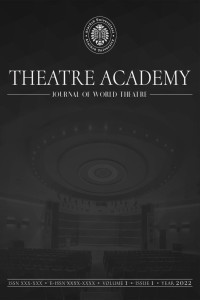Top Girls ve Yerma Adlı Oyunlarda Feminist Anneler ve Kızlar
Bu çalışma, Caryl Churchill'in Top Girls (1982/1991) ve Simon Stone'un Yerma (2017) adlı oyunlarını feminist annelik kuramları aracılığıyla ele almaktadır. Bu iki oyunun baskın özelliği anne-kız ilişkisini işlemesidir. Yerma adlı oyun Federico Garcia Lorca’nın (1934/1968) aynı adlı oyunundan uyarlanmıştır. Çalışmada incelenen anneler, açıkça feminist olduklarını ifade etmeseler de okurların/izleyicilerin onları feminist olarak tanımlamalarına sebep olabilecek birtakım özellikler arz etmektedir. Annelerin ve özellikle de çevrelerindeki kişilerin tasvirinden hareketle bu makale, güçlü kadın ve başarılı bir kariyer ile annelik arasındaki geleneksel uyuşmazlığın yeniden üretildiğini iddia etmektedir. Çağdaş bir oyun olan Yerma’daki anne Helen, Top Girls'ün kahramanı Marlene ile aynı kuşağa ait olarak kabul edilebilir. Marlene’in kızıyla sorunlu ilişkisi, birkaç on yıl sonra Helen’in annelik deneyimine yansımıştır. Her iki anne de güçlü kadındır fakat güçlerinin kaynağı annelikleri değildir ve bu güç, kızlarına intikal etmez.
Anahtar Kelimeler:
feminism, motherhood, British theatre, mother-daughter relationship
Feminist Mothers and Daughters in Top Girls and Yerma
Through feminist theories of motherhood, this essay discusses the mother-daughter relationship, a dominant feature of two British plays, Top Girls (1982/1991) by Caryl Churchill and Yerma (2017) by Simon Stone, the latter being an adaptation of Federico Garcia Lorca’s (1934/1968) play with the same title. The mothers on which this essay focuses present certain characteristics and express certain views that lead the readers/audience to identify them as feminists, though they do not declare themselves as such. What this essay argues is that the portrayal of these mothers, and particularly through the attitude of people around them, reproduces the traditional incompatibility between female empowerment and motherhood, between having a successful career and being a mother. The mother in the contemporary play Yerma can be regarded as belonging to the same generation with Marlene, the protagonist from Top Girls whose problematic relationship with her daughter is mirrored in Helen’s experience of motherhood, few decades later. Both mothers are empowered women, yet their empowerment does not come though motherhood and moreover, they do not pass it on to their daughters.
Keywords:
feminism, motherhood, British theatre, mother-daughter relationship,
___
- Billington, M. (2019, April 4). Top Girls review – Churchill's study of bourgeois feminism gets an epic makeover. The Guardian. Retrieved from https://www.theguardian.com/stage/2019/apr/04/top-girls-review-caryl-churchill-revival-lyttelton-national-theatre
- Chodorow, N. (1978). The Reproduction of Motherhood. Psychoanalysis and the Sociology of Gender. London: University of California Press.
- Churchill, C. (1991). Top Girls. In B. Naismith & N. Worrall (Eds.), Caryl Churchill Top Girls. London: Methuen Drama. (Original work published 1982)
- Churchill, C. (2019). Top Girls. National Theatre at Home. https://www.ntathome.com/videos/top-girls
- Clapp, S. (2016, August 7). Yerma five-star review – Billie Piper is earth-quaking as Lorca's heroine. The Guardian. Retrieved from https://www.theguardian.com/stage/2016/aug/07/yerma-review-young-vic-billie-piper-simon-stone
- Dorney, K., & Gray, F. (2013). Played in Britain: Modern Theatre in 100 Plays. London: Methuen Drama.
- Euripides. (2009). Hippolytus (T. Wertenbaker, Trans.). London: Faber and Faber. (Original work dates back to 428 BC)
- Garcia Lorca, F. (1968) Yerma (J. Graham-Lujan & R. L. O’Connell, Trans.). (Original work published 1934)
- Gordon, T. (1990). Feminist Mothers. London: Macmillan.
- Hard, H. J. (2004). The Routledge Handbook of Greek Mythology. London and New York: Routledge.
- Hirsch, M. (1989). The mother/daughter plot: Narrative, Psychoanalysis, Feminism. Bloomington and Indianapolis: Indiana University Press.
- hooks, b. (2015). feminist theory: from margin to center. New York and London: Routledge.
- Jung, C. G. (2004). Four Archetypes. Mother, Rebirth, Spirit, Trickster. (R. F. C. Hull, Trans.). London and New York: Routledge. (Original work published 1954)
- Maroney, H. J. (1985). Embracing motherhood: New feminist theory. CTheory, 9(1-2), 40-64.
- National Theatre at Home (2020). https://www.ntathome.com/browse.
- O'Reilly, A. (2021). Matricentric Feminism: Theory, Activism, Practice. Bradford: Demeter Press.
- Rees, C. (2020). Contemporary British Drama. Red Globe Press.
- Rich, A. (1995). Of Woman Born: Motherhood as Experience and Institution. New York, London: W.W. Norton & Company.
- Stone, S. (2017). Yerma. London: Oberon Books.
- Stone, S. (2017). Yerma. National Theatre at Home. https://www.ntathome.com/yerma/videos/yerma-full-play
- Takševa, T. (2018). Motherhood studies and feminist theory: Elisions and intersections. Journal of the Motherhood initiative for Research and Community involvement.
- Başlangıç: 2023
- Yayıncı: Atatürk Üniversitesi
Sayıdaki Diğer Makaleler
Harold Pinter’ın Git-Gel Dolap Adlı Oyunu Üzerinden Absürd Tiyatro’da Komiğin İşlevselliği
Top Girls ve Yerma Adlı Oyunlarda Feminist Anneler ve Kızlar
Çağdaş Bir Ahlak Oyunu Olarak Carol Ann Duffy’nin Everyman (2015) Adlı Oyunu
Shelagh Stephenson’ın The Memory of Water adlı Oyununda Hafıza ve Hatırlama
Açılmak ya da Açılmamak: Zodwa Nyoni'nin Nine Lives Oyununda Kuir Açılması
